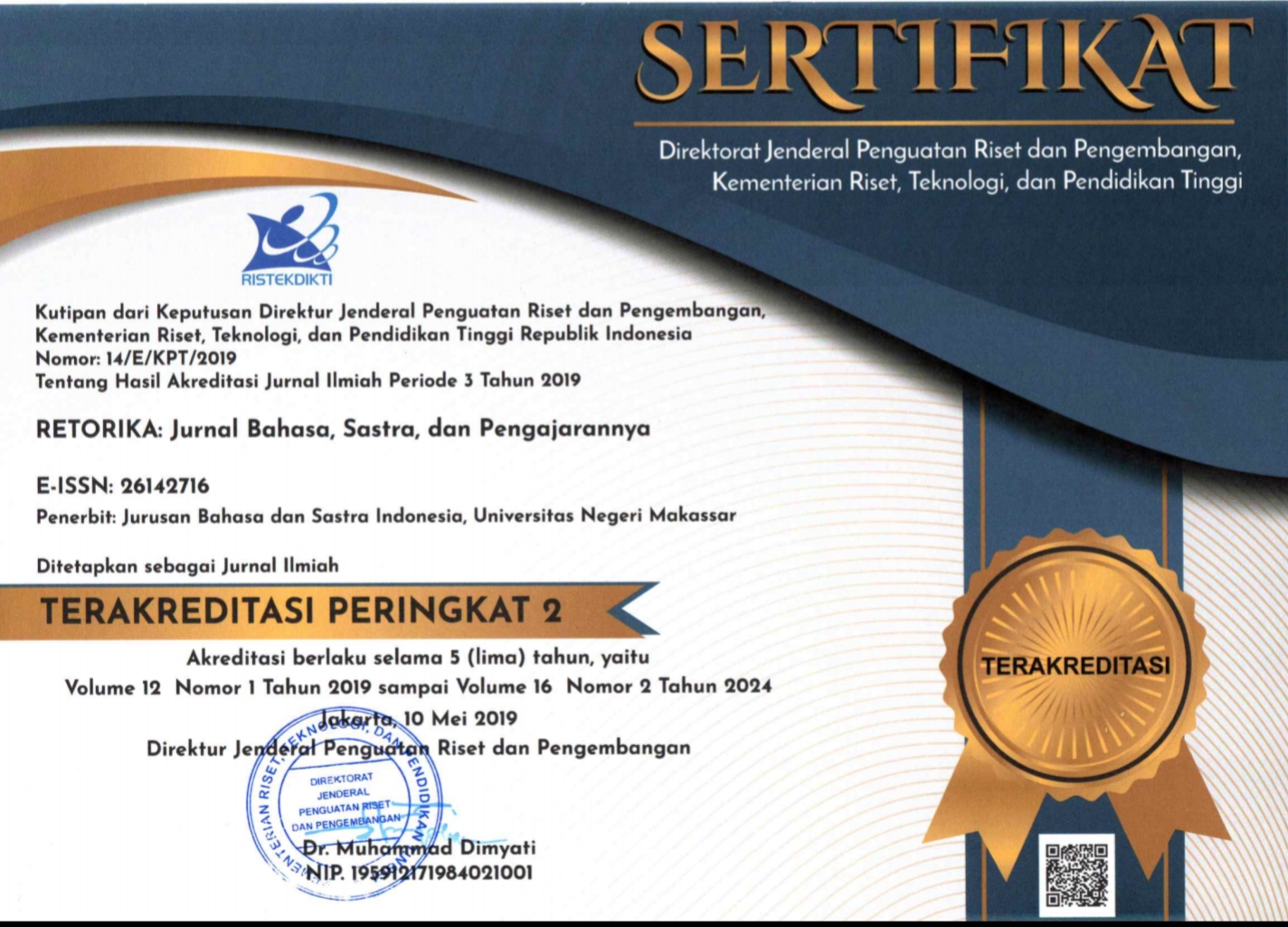THE EFFECTIVENESS OF CONSTRUCTIVE LEARNING ENVIRONMENT MODELS IN LEARNING LISTENING SKILLS TO IMPROVE COLLEGE STUDENT LEARNING OUTCOMES
(1) Universitas Negeri Semarang
(2) Universitas Negeri Semarang
(3) Universitas Negeri Semarang
(*) Corresponding Author
DOI: https://doi.org/10.26858/retorika.v17i1.54028
Abstract
Objective study this is for know effectiveness of environmental models study constructive in learning skills listen . Method study this use type quantitative quasi experiment (experiment pseudo) with nonequivalent control group design. Study this conducted at Eleven March University as group control and Semarang State University as group experiment with using a learning model environment Study constructive. Instrument study this consists from instrument test and non- test . Instrument the test form test essay college students, meanwhile instrument non-test form interviews, questionnaires, observations. Data analysis techniques are used for know appropriateness instrument study form validity and reliability, for test condition data analysis in the form of normality and homogeneity tests, as well as for test hypothesis using sample t test paired and sample t test independent test. Research result shows the class t test experiment shows the environmental model study constructive proven effective. The results of the t test analysis stated that the average posttest score for the UNS (control) group was 80.25 and the average score group Unnes (experimental ) of 87.19, there is the average difference in data is 6,942. The t-test value is 3.936 and is significant of 0,000. That figure show significant numbers (0.000 < 0.05) are meaningful there is significant difference use of environmental models study constructive to the group experiment more effective with acquisition figure 87.19 compared group control. Therefore that, based on findings research, use of environmental models study constructive in learning skills listen more effective and possible increase results study student.
Keywords
Full Text:
PDFReferences
Akpan, J. P., & Beard, L. A. (2016). Using Constructivist Teaching Strategies To Enhance Academic Outcomes Of Students With Special Needs. Universal Journal Of Educational Research, 4(2), 392-398.
Alkalaf, TMT, Obeidat , O.S., & Nawafleh, A.S (2021). The Effectiveness Of A Constructive Learning Approach In Acquiring Science Processes And Developing Thinking Skills: A Meta-Analysis Study By. Turkish Journal Of Computer And Mathematics Education, 12 (11).
Amal, A., Asti, A.S.W, & Ilyas, N.S.(2023). The Influence Of Learning Styles On The Language Ability Of Kindergarten Children. Makassar: Rhetoric Journal Of Language, Literature And Teaching.16(2).
Arslan, S., Garcia, F. J., Guo, M., Kellinger, M. W., Kruglyak, S., Levieux, J. A., & Previte, M. (2024). Sequencing By Avidity Enables High Accuracy With Low Reagent Consumption. Nature Biotechnology, 42(1), 132-138.
Cayubit, Ryan Francis O. (2021). Why Does Learning Environment Matter ? An Analysis On How The Learning Environment Influences The Academic Motivation, Learning Strategies And Engagement Of College Students. Learning Environments Research. 25(1).
Chawla, L. (2020). Childhood Nature Connection And Constructive Hope: A Review Of Research On Connecting With Nature And Coping With Environmental Loss. People And Nature, 2(3).
Christian, S. R, Baido , K. L., & Fitzallen , N. (2021). Revisiting The Relationship Between Constructive Alignment And Learning Approaches: A Perceived Alignment Perspective. Plos One, 16 (8), Doi: Https://Doi.Org/10.1371/Journal.Pone.0253949.
Care, E., Scoular, C., & Griffin, P. (2016). Assessment Of Collaborative Problem Solving In Education Environments. Applied Measurement In Education, 29(4).
Dennick, R. (2016). Constructivism: Reflections On Twenty Five Years Teaching The Constructivist Approach In Medical Education. International Journal Of Medical Education, 7.
Eaton, M. (2020). The Perfect Blend: A Practical Guide To Designing Student-Centered Learning Experiences. International Society For Technology In Education.
Hwang, G. J., Lai, C. L., & Wang, S. Y. (2015). Seamless Flipped Learning: A Mobile Technology-Enhanced Flipped Classroom With Effective Learning Strategies. Journal Of Computers In Education, 2, 449-473.
Johnson, A. J., & Vinding, A.. (2023). Subverting Resistance To Social Justice And Diversity Education: Constructive Approaches With Undergraduate Students. Springer Nature.
Joyce, B., Weil, M., Calhoun, E. (2009). Learning Model. Jogjakarta: Library Student.
Kasemsap, K. (2015). Theory Of Cognitive Constructivism. In Information Seeking Behavior And Technology Adoption: Theories And Trends. IGI Global.
Khan, M., Inam , A., & Saif , J. (2021). Effect Of Storytelling On Listening Skills And Vocabulary Of Preschool Children. Journal Of Early Childhood Care And Education, 5 (2), Doi:Https ://Doi.Org/10.30971/Jecce.V5i2.1297.
Killen, R., & O'Toole, M. (2023). Effective Teaching Strategies 8e. Cengage AU.
Maravilhas, S., & Martins, J. (2019). Strategic Knowledge Management In A Digital Environment: Tacit And Explicit Knowledge In Fab Labs. Journal Of Business Research, 94.
Miralpeix, I., & Muñoz, C. (2018). Receptive Vocabulary Size And Its Relationship To EFL Language Skills. International Review Of Applied Linguistics In Language Teaching, 56(1).
Muijs, D., & Reynolds, D. (2017). Effective Teaching: Evidence And Practice. Sage.
Naryatmojo, D.L. (2015). Utilization Of Learning Media In Learning Skills Listen For Increase Competence Study Student. Report Study. Semarang: Unnes.
Naryatmojo , D.L. (2019). Internalization Of The Concept Of Local Wisdom For Students In The Listening Class. Journal Arab World English Journal (AWEJ), 10(1).
Naryatmojo, D. L. (2020 ). Skills Listening. Semarang: LP2M Unnes .
Olofson, M. W., Swallow, M. J., & Neumann, M. D. (2016). Tpacking: A Constructivist Framing Of TPACK To Analyze Teachers' Construction Of Knowledge. Computers & Education, 95.
Prasetya, B. (2007). Understanding Liste. Www.Budiprasetyo/Pengertianmenyimak.Co.Id .
Sambell, K., Brown, S., & Graham, L. (2017). Professionalism In Practice: Key Directions In Higher Education Learning, Teaching And Assessment. Springer.
Sugiyono .(2019). Methodology Study Quantitative And Qualitative As Well As R&D. Bandung: Alfabeta.
Strayhorn, T. L. (2018). College Students' Sense Of Belonging: A Key To Educational Success For All Students. Routledge.
Wahab, A., Azhar, M., Sudarmono, M. A., & Zainal, A. Q. (2023). Constructive Learning Models On Students' Understanding And Application Of Learning Concepts. Tafkir: Interdisciplinary Journal Of Islamic Education, 4(2), 363-372.
Article Metrics
Abstract view : 164 times | PDF view : 17 timesRefbacks
- There are currently no refbacks.
Copyright (c) 2024 Deby Luriawati Naryatmojo

This work is licensed under a Creative Commons Attribution-NonCommercial 4.0 International License.
Published by:
Department of Indonesian Language, Faculty of Languages and Literature, Universitas Negeri Makassar in cooperate with Asosiasi Dosen Bahasa dan Sastra Indonesia (ADOBSI) and Ikatan Program Studi Pendidikan Bahasa dan Sastra Indonesia (IKAPROBSI).
Address: Department of Indonesian Language Office, DG Building Second Floor, UNM Parangtambung, Daeng Tata Raya Street, Makassar, South Sulawesi, Indonesia
 Email: [email protected]
Email: [email protected]

RETORIKA: Jurnal Bahasa, Sastra,dan Pengajarannya is licensed under a Creative Commons Attribution-NonCommercial 4.0 International License.
















